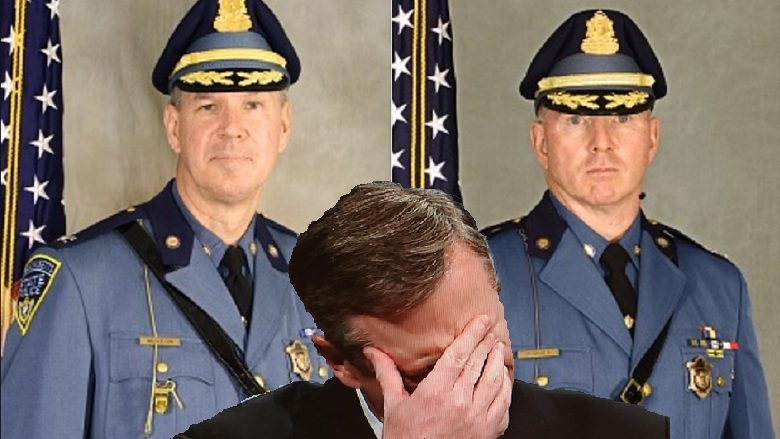Baker Finally Goes ‘Criminal’ On Massachusetts State Police Scandals Following Another OT Abuse Report
By Evan Lips | March 26, 2018, 21:31 EDT

BOSTON — Governor Charlie Baker’s Massachusetts State Police problem ballooned over the weekend following a damning report revealing that the Bay State’s top law enforcement agency allegedly withheld salary data from its Boston Seaport and Logan Airport barracks since at least 2010.
On Monday, the Swampscott Republican told reporters gathered at Dorchester’s South Bay shopping plaza following a MassWorks Infrastructure Program “celebration” that he expects the next step involving the latest State Police overtime scandal to be “the criminal investigation by the attorney general, which should figure out whether or not in fact this is stealing.”
Baker’s decision to utter the word “criminal” marked his first such instance dating back to mid-November’s filing of the still yet-to-be-decided federal lawsuit alleging a conspiracy involving top State Police brass — and Baker’s public safety and security chief, Daniel Bennett, claiming the team worked together to intimidate a state trooper into scrubbing embarrassing and incriminating details from the drug-related arrest report of a prominent Worcester County judge’s daughter.
The following months saw the retirements of additional top-level Massachusetts State Police staff, the suspension of a K-9 state trooper who rose to her position despite an admitted drug-dealing history, and a department-led investigation into a slew of troopers assigned to Troop E, the so-called Ted Williams Tunnel Barracks, who allegedly bilked taxpayers for thousands of dollars in overtime shifts they apparently never worked.
The latest State Police-related scandal involves Troop F, the highway outfit assigned to Logan Airport-related patrols, which state officials say has not reported an entire unit’s salary and overtime data to the state comptroller’s office since at least 2010.
The eye-popping report was not the result of a government-led audit — like the overtime-abuse probe currently involving Troop E, which last week saw nine active state troopers suspended without pay with another nine opting to immediately file for retirement.
Instead, it was the Boston Globe data-reporting team consisting of Todd Wallack and Matt Rocheleau that managed to obtain the records, which showed that at least 79 percent of the 140-trooper Troop F division took home more than $150,000 last year.
The division as a whole made more than $32.5 million.
A New Boston Post report published last Thursday confirmed the identities of two troopers assigned to Troop E — the Seaport-based outfit — who managed to file for retirement ahead of the audit and subsequent investigation. The New Boston Post story pointed to Baker’s apparent reluctance to outright label any of the past several months’ scandals involving the Massachusetts State Police as “criminal,” the description Senate President Harriette Chandler used during a Boston Public Radio interview last Thursday.
Baker’s communications team, however, contacted New Boston Post the following morning requesting a clarification. According to Baker’s communications staff, the governor should be credited with labeling the actions of Massachusetts State Police personnel as potentially criminal, since Attorney General Maura Healey has launched several investigations.
The Globe report, however, relied upon data dating back to 2010 that was apparently never sought by either Baker’s nor former Democratic Governor Deval Patrick’s administrations, or Attorney General Healey’s office.
During his appearance in Dorchester on Monday, Baker took a more forceful tone than he has in previous months, saying that the failure during the last eight years of the Massachusetts Port Authority — home to Logan Airport, where Troop F operates — and the State Police to file financial data with the state comptroller — was “clearly deliberate.”
Continued Baker:
“I’d certainly be the first to agree that it’s important for the State Police to get its act together, and I would argue that some of the actions that have been taken by the new colonel so far are directly designed to address some of those issues.”
Baker tapped Colonel Kerry Gilpin to lead the State Police in November immediately after its former head, Colonel Richard D. McKeon, retired in the wake of a state trooper’s filing of the judge-daughter arrest report federal lawsuit.
“It’s clear that the State Police is going to have to work back some of that public credibility that’s been sacrificed by some of these really bad actors,” Baker added.











